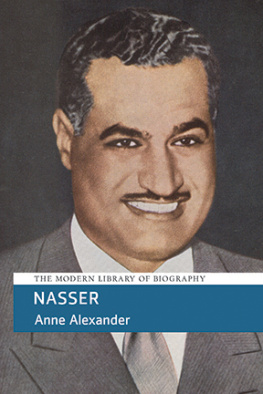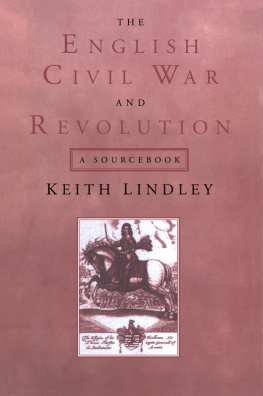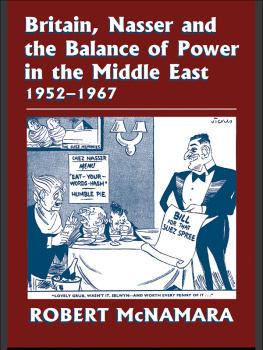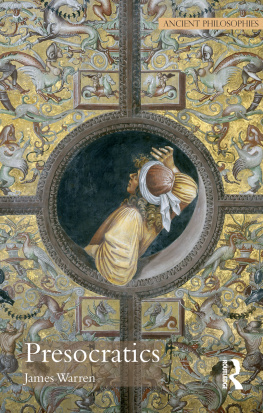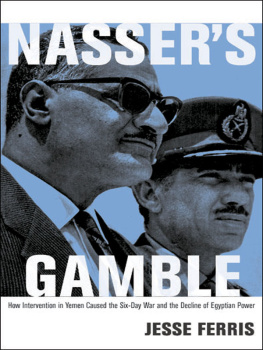Alexander Anne - Nasser
Here you can read online Alexander Anne - Nasser full text of the book (entire story) in english for free. Download pdf and epub, get meaning, cover and reviews about this ebook. City: London;Egypt;Égypte, year: 2005;2017, publisher: Chicago Distribution Center (CDC Presses);Haus, genre: Politics. Description of the work, (preface) as well as reviews are available. Best literature library LitArk.com created for fans of good reading and offers a wide selection of genres:
Romance novel
Science fiction
Adventure
Detective
Science
History
Home and family
Prose
Art
Politics
Computer
Non-fiction
Religion
Business
Children
Humor
Choose a favorite category and find really read worthwhile books. Enjoy immersion in the world of imagination, feel the emotions of the characters or learn something new for yourself, make an fascinating discovery.
- Book:Nasser
- Author:
- Publisher:Chicago Distribution Center (CDC Presses);Haus
- Genre:
- Year:2005;2017
- City:London;Egypt;Égypte
- Rating:3 / 5
- Favourites:Add to favourites
- Your mark:
- 60
- 1
- 2
- 3
- 4
- 5
Nasser: summary, description and annotation
We offer to read an annotation, description, summary or preface (depends on what the author of the book "Nasser" wrote himself). If you haven't found the necessary information about the book — write in the comments, we will try to find it.
Nasser — read online for free the complete book (whole text) full work
Below is the text of the book, divided by pages. System saving the place of the last page read, allows you to conveniently read the book "Nasser" online for free, without having to search again every time where you left off. Put a bookmark, and you can go to the page where you finished reading at any time.
Font size:
Interval:
Bookmark:

Nasser
Nasser
Anne Alexander
HAUS PUBLISHING LONDON
First published in Great Britain by
Haus Publishing Limited
26 Cadogan Court
London SW3 3BX
Copyright Anne Alexander, 2004
The moral right of the author has been asserted
A CIP catalogue record for this book is available from the British Library
ISBN 1-904341-83-7 (paperback)
Designed and typeset in Garamond and Futura by Andrea El-Akshar, Kln
Printed and bound by Graphicom in Vicenza, Italy
Front cover: Time Magazine cover, 26 September 1955, courtesy of
Time Life pictures/Getty Images
Back cover: Egypt Historical Archive
CONDITIONS OF SALE
All rights reserved. No part of this publication may be reproduced, stored in a retrieval system, or transmitted in any form or by any means, electronic, mechanical, photocopying, recording or otherwise, without the prior permission of the publisher
This book is sold subject to the condition that it shall not, by way of trade or otherwise, be lent, re-sold, hired out or otherwise circulated without the publishers prior consent in any form of binding or cover other than that in which it is published and without a similar condition including this condition being imposed on the subsequent purchaser
A childhood at the end of empire
Later, he would have the scar airbrushed out of his official photographs. But as a seventeen-year old student leader he wore the mark left on his forehead by a police officers bullet as a badge of honour. Along with thousands of other Egyptian schoolboys, Gamal Abd-al-Nassers first experience of political organisation came with a maelstrom of demonstrations in 1935 and 1936. Two students were killed, and Gamal was lucky to escape with only a graze.
The protests left a permanent mark on Egyptian political life. More than a rite-of-passage, 1936 represented a turning point for a generation. It was the moment when Egypts political centre of gravity moved out of the corridors of parliament into the street. After 1936, the liberal politicians and imperial civil servants who hoped to trammel Egypts nationalist movement would find themselves swimming against a slowly rising tide.
Many years later Nasser wrote that 1936 was the year he lost faith in Egypts leaders. In those days I led demonstrations from al-Nahda school, shouting at the top of my voice for complete independence, with many others following behind. But our cries died into faint echoes, blown away by the winds. We moved no mountains and cracked no rocks. Then I decided that positive action meant uniting all the leaders of Egypt behind a single slogan. So our chanting, rebellious crowd went round to their homes, one by one, demanding in the name of Egypts youth, that they come together. They did unite on one issue, but their decision destroyed my faith they agreed to conclude the Treaty of 1936.
Like an old scar under the skin, 1936 changed the face of Egypt.
The Empire and Egypt
The Foreign Office mandarins who drew up the Anglo-Egyptian Treaty of 1936 seem to have regarded the document as an exercise in tidying up the historical record. Under the agreement, Egypts independence was confirmed and the country entered the League of Nations. The all-powerful High Commissioner became simply the British Ambassador, British control of the Egyptian army was relaxed and the officer corps opened to ordinary citizens a decision which was to play an important part in Nassers own life.
Yet for many Egyptians, the 1936 Treaty was a betrayal of their hopes for real independence. After half a century of occupation, Nasser and his classmates wanted an end to British power in Egypt, not the semi-colonial status promised by the Treaty. The roots of their adolescent rage lay in the tangled history of European imperial ambitions in the Middle East.
Long before Britain occupied Egypt in 1882, European capital and European imperial power had begun to shape the Egyptian economy. Muhammad Ali, an Albanian mercenary who founded Egypts last dynasty in the early 19 th century, was the first in the Middle East to challenge European economic penetration. Although he represented the Ottoman Sultan in Istanbul, Muhammad Ali sought to carve out an independent role for himself and his heirs. He conquered the Hejaz and Syria, sent expeditionary forces to Sudan, and began to develop industries to compete with the European goods flooding local markets.
After British forces occupied Alexandria in 1882, cotton secured Egypt a place in Britains imperial economy, with the Nile plantations providing the raw material for Lancashire spinning mills.
By the end of the 19 th century, many areas of Egypts economy had been skewed towards the cotton economy. Those sectors of agriculture and transport concerned with the production and transport of raw cotton developed quickly, while other areas stagnated.
In 1839 Muhammad Ali sent his army against his masters in Istanbul, prompting a European intervention to save the Ottoman Empire from collapse. Defeated in battle, Ali was forced to dismantle the tariff barriers, which had protected his fledgling local industries from European competition. The years after his death saw increasing European investment in what became one of the emerging markets of the day. On the stock exchanges of London and Paris, investors rushed to buy shares in fashionable projects, such as the Suez Canal.
For French engineers and investors the Canal was a symbol of progress and enlightenment. Egyptians saw it rather differently. Egypts ruling family heirs of Muhammad Ali now relegated to the status of mere governors, or Khedives press-ganged tens of thousands of construction workers. Forced labour still played a central role in Egypts semi-feudal agricultural system and thousands toiled to ensure that European investors collected their dividends on time. Yet despite mortgaging Egypt to the hilt to pay for the canal, the Khedival family saw little return on its investment.
Colonel Urabis revolt
From the point of view of European speculators, the outlook was far less bleak. In 1878 European administrators took over the running of Egypts economy to prevent the bankrupt country defaulting on her debts. The Egyptian budget was placed in the hands of an Anglo-French commission of bankers, which increased taxes to pay creditors in London and Paris. Even the Times correspondent in Alexandria felt uneasy about the debt collection system. He wrote in 1879 that the produce collected on behalf of the banks consists wholly of taxes paid by the peasants in kind, and when one thinks of the poverty-stricken, overdriven, underpaid fellahin {peasants} in their miserable hovels, working late and early to fill the pockets of the creditors, the punctual payment of the coupon ceases to be wholly a subject of gratification.
In 1854, Said Pasha, the Ottoman Vice-Regent of Egypt, granted the French engineer Ferdinand de Lesseps the right to dig and operate the Suez Canal.
This alliance between Muhammad Alis heir and French capital mobilised twenty thousand Egyptian peasants and millions of francs to construct the waterway.
Burdened by huge debts generated by extravagant purchases of European machinery and by the ruinous interest rates charged by European bankers Ismail Pasha sold Egypts stake in the Canal Company to British Prime Minister Benjamin Disraeli in 1875.
In the Nile Valley desperate peasants took to banditry. Demonstrations under the slogan Egypt for the Egyptians rocked the major cities. Colonel Ahmad Urabi, a nationalist army officer who criticized Khedive Tawfiqs dependence on European advisers, became the focus of discontent. Demonstrations and petitions forced Tawfiq to invite Urabi into his cabinet as Minister of War. Urabi and his supporters purged the army and government of Europeans and the Khedives supporters. In May 1882, fearing for their financial interests, Britain and France demanded his dismissal, only to face a popular revolt. Protestors organised an assembly which set up a common-law government and deposed the Khedive, appealing over his head to the Ottoman Sultan in Istanbul.
Next pageFont size:
Interval:
Bookmark:
Similar books «Nasser»
Look at similar books to Nasser. We have selected literature similar in name and meaning in the hope of providing readers with more options to find new, interesting, not yet read works.
Discussion, reviews of the book Nasser and just readers' own opinions. Leave your comments, write what you think about the work, its meaning or the main characters. Specify what exactly you liked and what you didn't like, and why you think so.

